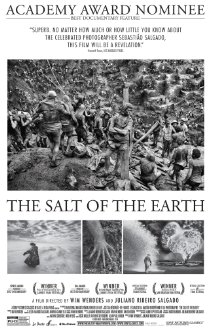
THE SALT OF THE EARTH
France/ Brazil, 2014, 111 minutes, Colour.
Sebastiao Salgado, Wim Wenders, Juliano Ribeiro Salgado.
Directed by Juliano Ribeiro Salgado, Wim Wenders.
This humane documentary combines the story of the Brazilian photographer, Sebastiao Salgado, with a gallery of his powerful photographs, taken over many decades, and a study of the people and places where he photographed.
The narrative begins with photographs of the silver mine in Brazil, the many gnarled characters scaling rocks, drilling, all eager to find some silver – and the commentary adds that people are the salt of the earth.
Celebrated film director, Wim Wenders, tells us that he came across one of these portraits, a study of a woman, and has had it hanging over his desk for many years. Which means that he was very pleased to be associated with this film, co-directing with the photographer’s son, Juliano Ribeiro Salgado, a cinematographer himself.
Introduced to the gallery with black-and-white photographs of the silver mine, the audience will be in intrigued as to the background of the photographer himself. He came from a poor family in Brazil, moved to the city for further education, especially in economics, got a job, married, and seemed to have a future in international companies with economic advice. However, he loved photography and decided that would give his full time to this work, supported by his wife who managed his photos, cataloguing, especially when on long trips.
Which he did. In those days, in the 1960s and 70s, he was tall and thin and rugged, wild hair and long beard. As he is interviewed for this film, often with super impositions of his face on locations and photographs, he is older and bald, but intensely serious, a lifetime of concern for his subjects and with profound and moving reflections.
Among the journeys he took was across South America, taking almost a decade. He is also shown visiting West Papua with its jungles and indigenous people. The journey which he found most heart-wrenching was that to Ruanda at the time of the genocide in 1994, observing, photographing, being caught up in the deep distress, finding that he could not go on photography expeditions for several years.
What caused him to be involved again was his awareness of the environment, the depredation of forests in his native Brazil, and his setting up an institute with his wife for the reforestation. Audiences will be amazed at the number of trees and the depth of the forests that have resulted from these initiatives. This also gave fresh impetus to his photography career, starting a Genesis Project, focusing on nature – and people - especially with intriguing photography of his working with the Brazilian jungle native community long hidden from “civilisation”.
By the end of the film, photographed in some detail by his son, co-directed by Wenders, the audience will have had a masterclass in photography but also a masterclass in human compassion, seeking out the salt of the earth and communicating something of their destinies, lives, hopes.
1. A film for photographers, for those who like cinema and photography?
2. The title, the salt of the earth being people, the photographs of people, the variety of situations?
3. The film is photography and biography, the Brazilian background, the village, the photographers education, his father and the farm, going to the city, his education, meeting his wife, studying economics, financial adviser, job prospects? Get his life and photography, enjoying it, the situation, his wife and son, full-time, the exhibition and launching a career?
4. The directors of the film, the photographer son, his part in his father’s life, his skills as a cinematographer? Wim Wenders and the story of his finding the photo, Annie get in his room, interest in the photographer? Taking on the role as producer and co-director?
5. The narration, the photographer’s life, the variety of the projects, over the decades, international success? His films in ethnography? The focus on his experience in wonder, the sufferings, the massacres, the inhumanity, the victims? His sense of despair? Some years without photography? Discovering nature, his Genesis project? He and his wife establishing the Institute, the reforestation, the millions of trees, the consequences? Bringing nature to people?
6. The personality of the photographer, when he was young, his hair and beard, away a lot of the time, the absent father, his relationship with his wife, her commitment to his work, cataloguing and preserving?
7. His son, missing his father, as a grown-up, the possibility of accompanying his father? His father’s advice, his comments about framing a picture and giving it life? The results?
8. The opening with the Brazilian miners, the commentary about the mine, gold, the difficulties? The trip across South America, 10 years, the variety of people, the different countries? The sequences in West Park were? The important ethnography of the Brazilian tribes, the wood in their chins, unsophisticated, yet becoming involved in a century in a sophisticated world?
9. Inventors, behind the camera, his appearance, the interview?
10. The career decision of the photographer, his commitment, his alertness to people, their lives, ordinariness, grief? The images of the director on screen, his interview? A good man, the Institute, his wife and experience?
11. Strongly humanitarian film?